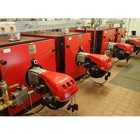Hoval continues to serve at Mylnes Court Edinburgh residences

A boiler upgrade at Mylnes Court, University of Edinburgh has seen ageing Hoval boilers replaced with the company’s high efficiency SR Plus and UltraGas boilers. The new boilers were specified by Engright Engineering Consultants and installed by contractors Taylor and Fraser.
Situated on the Royal Mile, Mylnes Court is a complex of buildings that includes three halls of residence, housing 176 postgraduate students in self-catered flats. A central boiler house provides space heating, domestic hot water and pre-heating of ventilation air in air handling units.
“The original system was designed to operate with medium temperature hot water but, at a later date, this was changed to a low temperature hot water system,” explained Engright’s David McNeill.
“As the boilers were still in good condition at the time, they were retained and adjusted to operate with lower flow and return water temperatures. However, as they got older a decision was taken to upgrade them. We selected Hoval boilers again as they offer the required efficiency, and their compact design helped to address space issues in the boiler house,” he continued.
Kevin Sweeney of Taylor and Fraser added: “The boiler upgrade, along with addition of control valves and shunt pumps for back-end protection, went very smoothly. We were very pleased with the support we received from Hoval during the project.”








